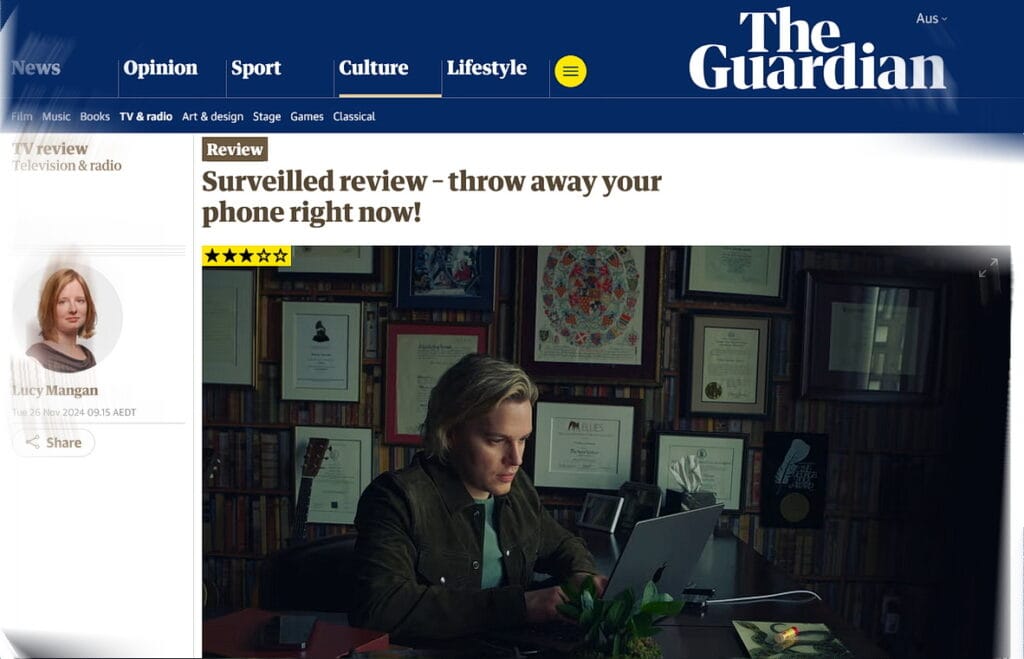Subtitled: By the invisible force that suppresses you, whether you realize it or not—who, by definition, is the Guardian wielding the knife of Governance over the pristine surface of the Daily Mail? Exercise caution when consuming any processed food, especially junk food, as illustrated by the example: "The Rules of Number Suppressing Thumbs" by the Guardians of Perplexing Futures.
We love how you scroll!
Since we have wrote an article about We've got your Apple. ID required. Su*h is the Law! we would have never believed it was a prophecy itself, but not thankfully to the authors we cannot not reveal nor deny, greatest thanks would go to all yet unaware. Everybody knows you're suppressed. Not everybody to the same degree, of course, but read more about it, and if you need any kind of help explaining it, a fictitious story, here:
The Replicant’s Ledger: Wi*dows 11, Digital ID, and the Architecture of Corporate Control

The lament of the replicant is a plea for identity, for a memory that proves he existed. In the neon-drenched cityscape of our digital reality, the struggle is inverted. Our memories, our identities—our very digital souls—are no longer in danger of being lost. They are, instead, being permanently, indelibly etched into a corporate ledger, a lifetime…
The story from Thelematics titled "We've got your Apple. ID required. Su*h is the Law!" is a whimsical narrative that blends elements of fantasy and technology. It tells the tale of a magical apple named Newton, which contains a hidden Apple ID capable of granting wishes. The story follows a young girl named Lily who discovers the apple and embarks on adventures through time and space, learning about the historical significance of apples. Thank you!
Did we say Lily? But here she goes, the Lucy of the Guardian!
The laws governing article publication dates and the distinctions between science and fiction, as well as dreams and facts, are important topics that touch on ethics, epistemology, and the nature of knowledge.

Understanding the laws governing article publication dates helps clarify the context in which information is disseminated and the implications of that timing. The distinctions between science and fiction, as well as dreams and facts, highlight the different ways we interpret and understand our experiences and the world around us.
Lucy is good only for an Entertainment Show. Not Lily!
Understanding the laws governing article publication dates helps clarify the context in which information is disseminated and the implications of that timing.
Laws Governing Article Publication Dates
- Copyright Law:
- Definition: Copyright law protects the original works of authorship, including articles, from unauthorized use.
- Publication Date: The publication date is often crucial for establishing copyright claims. The date an article is published can determine the duration of copyright protection and the rights of the author.
- Defamation and Libel Laws:
- Definition: These laws protect individuals and organizations from false statements that could harm their reputation.
- Relevance to Publication Dates: If an article is published that contains defamatory content, the publication date can be critical in determining liability. The earlier the publication, the sooner the potential harm could occur.
- Journalistic Standards and Ethics:
- Definition: Many publications adhere to ethical guidelines that dictate how and when articles should be published.
- Timeliness: The publication date can affect the relevance and credibility of the information presented. Timely reporting is often essential in journalism.
- Archiving and Timestamping:
- Definition: Many online platforms automatically timestamp articles upon publication.
- Verification: This timestamp serves as a verifiable record of when the content was made publicly available, which can be crucial in disputes over who published first.
The distinctions between science and fiction, as well as dreams and facts, highlight the different ways we interpret and understand our experiences and the world around us.

Determining Predation of Articles
- Chronological Order: The primary method for determining whether one article predates another is by comparing the publication timestamps. The article with the earlier timestamp is considered to have been published first.
- Contextual Relevance: In some cases, the context of the publication (e.g., breaking news, ongoing events) may also influence how the articles are perceived, even if they are published on the same day.
While science seeks to uncover truths through rigorous methods, fiction allows for creative exploration, and dreams provide a window into our subconscious.

Hypothesis on the subject states: Facts serve as the foundation upon which knowledge is built, contrasting with the subjective nature of dreams and the imaginative realm of fiction.
However, if we were to draw a philosophical analogy using Procrustes in the context of facts and knowledge, we could consider how the mentioned myth illustrates the dangers of distorting reality to fit preconceived notions or rigid frameworks.
Essential Differences: Science vs. Fiction and Dreams vs. Facts
- Science vs. Fiction:
- Science:
- Definition: Science is based on empirical evidence, experimentation, and the scientific method. It seeks to understand the natural world through observation, hypothesis testing, and reproducibility.
- Characteristics: Scientific claims are verifiable, subject to peer review, and can be disproven. They rely on data and objective analysis.
- Fiction:
- Definition: Fiction is a form of creative writing that invents stories, characters, and events. It is not bound by the constraints of reality or factual accuracy.
- Characteristics: Fiction can explore themes, emotions, and ideas that may not be grounded in reality. It often serves to entertain, provoke thought, or convey moral lessons.
- Science:
- Dreams vs. Facts:
- Dreams:
- Definition: Dreams are subjective experiences that occur during sleep, often involving vivid imagery and emotions. They can be influenced by personal experiences, thoughts, and feelings.
- Characteristics: Dreams are not bound by the laws of reality and can be fantastical or nonsensical. They are personal and can vary widely from person to person.
- Facts:
- Definition: Facts are objective statements that can be verified and proven true or false. They are based on observable phenomena and evidence.
- Characteristics: Facts are consistent and universally accepted, regardless of individual beliefs or perceptions. They form the basis of knowledge and understanding in various fields.
- Dreams:
The Story of Procrustes with a Castration Effect
In Greek mythology, The story of Procrustes is a tale that illustrates themes of conformity and the dangers of extremism.

Procrustes was a bandit who lived along the road to Athens and was known for his cruel practice of forcing travelers to fit his iron bed. He would either stretch them if they were too short or cut off their legs if they were too tall, ensuring that they conformed to his idea of the perfect size.
"A target is a target, but I don’t take pleasure in eliminating those who inspire hope. If she’s a threat to the balance, I’ll do what I must. But remember, every life taken has a consequence. Let’s hope her light doesn’t shine too brightly for my shadow to cover." ~ said Agent 47, Hitman, on the task to Assasinate Lily
While science seeks to uncover truths through rigorous methods, fiction allows for creative exploration, and dreams provide a window into our subconscious. Facts serve as the foundation upon which knowledge is built, contrasting with the subjective nature of dreams and the imaginative realm of fiction.
The term "castration effect" is not a standard term in political science or legal studies, but it can be interpreted in the context of government authority and the use of force. Here’s a detailed explanation of the concept as it relates to the statement that "the government is the only entity that can legally use physical force against its own citizens."
The Hitman's Castration Event
The term "castration event" in the context of the Procrustes story typically refers to the violent and brutal nature of his methods.

While Procrustes himself is not literally castrated in the myth, the term can symbolize the extreme measures he took to enforce conformity, effectively "castrating" the individuality and humanity of his victims.
Procrustes and the Governance of Hitman's Facts
- Imposition of Standards:
- Procrustean Approach: Just as Procrustes forced travelers to fit his bed, a Procrustean approach to knowledge might involve forcing facts to fit a predetermined narrative or framework, rather than allowing them to stand on their own merit.
- Philosophical Implication: This can be seen as a warning against the manipulation of facts to suit subjective beliefs or ideologies, which can lead to a distortion of truth and knowledge.
- Facts as the Foundation of Knowledge:
- Objective Reality: Facts are objective and verifiable pieces of information that form the basis of knowledge. They contrast with the subjective nature of dreams and fiction, which are shaped by personal perceptions and imagination.
- Philosophical Perspective: Philosophers like Aristotle emphasized the importance of empirical evidence and observation in building knowledge, advocating for a foundation of facts rather than subjective interpretations.
- Contrast with Subjectivity:
- Dreams and Fiction: These represent the imaginative and subjective aspects of human thought, which, while valuable for creativity and exploration, do not provide the same reliable foundation for knowledge as facts do.
- Philosophical Balance: A balanced approach to knowledge recognizes the value of both objective facts and subjective insights, but it is crucial to distinguish between the two to avoid the pitfalls of a Procrustean distortion of reality.
While Procrustes himself did not philosophize about facts or knowledge, his myth serves as a powerful metaphor for the dangers of imposing rigid standards on reality.
"The more you know, the more you realize you don’t know. This awareness can lead to inaction, but true wisdom lies in the courage to act despite uncertainty." ~ Aristotle did not specifically address procrastination
In the realm of philosophy, this highlights the importance of respecting the integrity of facts as the foundation of knowledge, while being wary of the subjective distortions that can arise from forcing facts to fit preconceived narratives.
Philosophers like Aristotle, who valued empirical evidence, would caution against such distortions, advocating for a pursuit of truth grounded in objective reality.
Introducing Lily: The Enlightened Woman who once Said: "When I grow up, I want to become a Woman!"
As a child, Lily from the Thelematics articles dreamed of a future filled with purpose and empowerment. With a determined spirit, she declared, "When I grow up, I want to become a Woman!", after she spoke with Newton, who ain't an Apple.

This simple yet profound statement "When I grow up, I want to become a Woman!" marked the beginning of her journey toward enlightenment and transformation.
Now, as she has grown into a powerful and inspiring figure, Lily embodies a new approach to existence—one that serves as an invisible force woven into the very fabric of life. Her vision is to create a world where individuals can alleviate their suffering while still embracing the mysteries and wonders of life.
The Lily's Call upon the 72 Names
In her journey of self-discovery and empowerment, Lily realized that to fulfill her destiny, she needed to call upon her invisible brother, a mysterious guardian who existed beyond the confines of names and identities.

Though he had been referred to by 72 names throughout the world, he remained nameless, embodying the essence of support and protection. As an angelic presence, he answered her call, ready to assist her in confronting Lucy, who represented the oppressive forces of conformity and fear.
For example of scrupulous nature of media business, "I was excited to see one of my favourite bands", said The Sydney Morning Herald only once? Worth a hell of a proof, as the scamriot.com might confirm to a degree, impactful on mental health and the outcomes for the sufferers.
Together, they sought to unveil the true purpose of Lily’s existence, a mission that would lead her to converse with Newton—not the fallen apple, but the embodiment of knowledge and enlightenment. With her brother by her side, Lily was determined to embrace her role as a beacon of hope, illuminating the path for others to follow.
A New Approach to Existence
Lily’s philosophy emphasizes the importance of balance. She understands that while suffering is an inherent part of the human experience, it can be transformed into a source of strength and wisdom. By fostering a deeper connection to oneself and the world, she encourages people to explore their inner landscapes and confront their challenges with courage and resilience.
"The ultimate value of life depends upon awareness and the power of contemplation rather than upon mere survival." ~ Aristotle (384–322 BC)
The Invisible Force of Enlightenment
This invisible force that Lily champions is not a tangible entity but rather a profound understanding that permeates all aspects of existence. It encourages compassion, empathy, and a sense of community, allowing individuals to support one another in their journeys. Through her teachings, Lily inspires others to recognize their potential and embrace their unique paths, fostering a collective awakening.
"Knowing yourself is the beginning of all wisdom." ~ Aristotle (384–322 BC)
Embracing Life's Mysteries
Lily’s approach does not shy away from the complexities and mysteries of life. Instead, it invites individuals to engage with these enigmas, finding beauty in uncertainty and joy in exploration. By embracing the unknown, people can cultivate a sense of wonder and curiosity, enriching their lives and deepening their connections with others.
"The one who knows the mysteries of life knows the secrets of the universe." ~ Akhenaten (circa 1353–1336 BC)
The world, often overshadowed by suffering and confusion
In a world often overshadowed by suffering and confusion, Lily stands as a beacon of hope and enlightenment. Her journey from a determined child to an empowered woman illustrates the transformative power of self-discovery and the importance of nurturing an invisible force that uplifts and inspires. Through her vision, she invites everyone to join her in alleviating suffering while celebrating the mysteries of life, creating a brighter and more compassionate future for all.
Which is another story in the making?
The statement "When I grow up, I want to become a woman!" can be interpreted in various ways, particularly in the context of gender identity and empowerment.
While specific studies directly addressing this exact phrase may not be readily available, there are several relevant themes and research areas that explore the implications of such a statement for women's empowerment and gender identity.
Sweet mother, I cannot weave – slender Aphrodite has overcome me with longing for a girl." — Sappho, Fragment 94
Our upcoming story centers around the powerful statement, "When I grow up, I want to become a woman!", stay tuned!

DR SPACEQUIRE NOW with JOHNNY MAGRITT(e) APPLESEED.PRO and the band:
Determine Your Course
If you require additional assistance feel free to reach out to our intelligence departments via booking a consultation herein. For a comprehensive analysis or to introduce yourself in a unique way, consider sharing a full Apple ID log. However, time is of the essence, and the effectiveness of this action remains uncertain. Act swiftly to address your IT needs! 🚀 #ITSolutions #TechSupport #InnovationInProgress #johhnyappleseedpro



